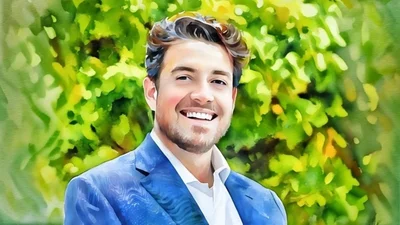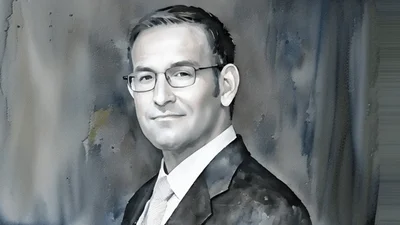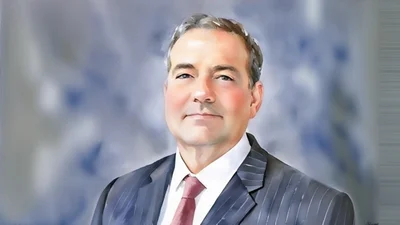Chris Bedford is the executive editor of the Common Sense Society. He is a Lincoln Fellow with the Claremont Institute, a Pulliam Fellow at Hillsdale College, and a Madison Fellow.
Federal Newswire:
What is the Common Sense Society?
Chris Bedford:
The Common Sense Society was founded in Budapest by Marion Smith, an American who was studying over there, and his now wife, Anna, who lives here in Virginia. It was started to bring [about] debate[s], initially about things that matter to the Budapest University they were at; and expanded to South Carolina when they moved back to the United States.
[They were bringing together] people [who wanted to] talk about big ideas. People coming together to talk about foreign policy, what the founders might have believed, philosophy, history.
It was more of a side project for a number of years and then about two years ago Marion joined it full-time…and since then it's rapidly expanded. There are fellowships right now in South Carolina, Scotland, London, and Hungary where they bring young rising intellectuals together and talk to them about the ideas of liberty and prosperity and beauty. As well as educating teachers, holding seminars, doing conferences, and bringing folks together.
I joined the Common Sense Society late last year with the intent of starting a general interest glossy magazine called Common Sense Magazine…It's going to have cooking, history, drinks, architecture, art, and music. But at its core, we'll have some very thoughtful pieces on where we are as a culture [and] society.
Articles from people from both the left and the right, but particularly challenging some of the elite opinions. Some of our models for magazines are things like Garden & Gun, for that kind of a feel, but to add an intellectual heft to it. So it would be an interesting magazine for casual reading or for really digging in.
Federal Newswire:
Is there a vast enough market for a magazine about beauty and intellectual discourse?
Chris Bedford:
I think there is. The late Roger Scruton was on our board and was active in the Common Sense Society and his concepts and ideas about culture, beauty, and music do inform a lot of what we're doing. By and large, common sense ideas have really seeded the culture.
I really loved the moment when the Martin Luther King Memorial was unveiled in Boston this past year. For the last 50 years, modern art has basically been a practical joke that the experts play on the regular people. They're always laughing at us. We look at it and they say, “trust me, you don't understand how beautiful this is.” You sit there scratching your head and say, “I think I see it.”
But the MLK Memorial, with two disembodied arms hugging each other, [that] was so over the top that everyone just immediately laughed at it.
The Boston Globe wrote an article, where the only person they could find saying anything positive about it was the mayor at the dedication speech. So we want to talk about some of the issues like that.
Why when you walk around Washington DC do you walk between gorgeous buildings like the Capitol and the Jefferson Library, and then you walk past some of the ugliest buildings you've ever seen. [For instance] the Housing and Urban Development building, just absolutely heinous. Okay, what's the difference between this? Where have we lost it and why can't we talk about that?
Federal Newswire:
As we move into an era of AI, the idea that a soulless artificial intelligence can somehow develop music is astounding. Is this what common sense is pushing back against?
Chris Bedford:
Exactly. It's pushing back against those sorts of things, the soullessness stuff, the lack of humanity.
Brutalism actually served a purpose for its founders. They wanted an architecture that made people feel small. They wanted to call out the ugliness of the world. They wanted an architecture that was simply efficient and strong, and that would not give people these lofty ideas about Western civilization and where they came from.
They were trying to let people know, you're just a cog in the machine, therefore you're a worker, therefore, you must rise up. It's Soviet architecture. It's very different from the way DC was crafted.
Federal Newswire:
Was it a mentality of you need to rise up or you need to get [in] your place as part of the proletariat?
Chris Bedford:
Depends on where they're building it. If they're building it in Washington DC, that sort of thing is to let you know [they want] to disconnect you from the civilization around you. But if you're in Soviet Russia, then this is your place. This is part of it.
Federal Newswire:
Is it a goal of the Common Sense Society to defend against the attacks on the principles of Western civilization?
Chris Bedford:
Yeah. It's not just under attack. It's crumbling. For example, let's take the statute debate that we're having right now in Richmond. I know that there are nuanced ideas about whether or not those statutes should have come down. I kind of lean towards yes. Some of my colleagues at Common Sense lean strongly toward no.
But what it really comes down to is, we live in a culture right now that's capable of tearing things down. Any kind of culture can. A barbarian tribe can tear things down. We don't live in a culture that's willing to build things up.
So if you go to Richmond's Monument Row, which does not need to have giant statues or confederate generals on it, it has nothing. It's got police fencing around empty pedestals, [some] pedestals are even gone. It's completely closed off. It's ugly, and it's sad.
You have to [have] a society that believes in itself, that understands truth, beauty, [and the] intrinsic value in these things in order to have a society that's willing to build them. We do have the skills. I remember after Notre Dame first caught on fire there were questions, “well, do we even have the skills to rebuild this?”
We absolutely do. There are incredible architects out there, incredible artists, which we hope to highlight, who are doing great work. But the second thing is, the best teacher you've got is the buildings themselves, the monuments themselves.
A good craftsman or artisan can walk into Notre Dame and look at the beams and look at how it's carved and they can figure out how to do it. That's exactly, thank goodness, what they are doing.
We can build beautiful statues. We can make great buildings. This is not lost knowledge. We don't live in an after-the-collapse of Rome, yet at least. But we need to have people who are willing to do it.
Just like we saw during Covid, it really expresses itself. We've been under the rule of experts for so long, [experts] who go against what the actual average person likes–what they think is beautiful [or] sounds good.
These experts always tell us we have to build courthouses like this. It has to be a cement block, it has to be disgusting, and we'll surround it with a homeless encampment because we're the experts.
There's a movement that's coming around [of] building some actually beautiful courthouses. I think one's in Santa Fe, I can't recall off the top of my head. People are pushing back and I want to light that spark and give people a place where they're like, “Hey, this is normal.”
It's normal to not like this bad art and bad architecture, and it's normal to like nice things. It's normal to want a prosperous society, and it's normal to not want to be ruled by experts. It should be normal to be able to enjoy a magazine without being force-fed all the kind of insanity we get from so much of our popular culture.
Federal Newswire:
There was a former Maryland state senator who came from a storied African-American, democratic political family. He had a very simple test for monuments, if it was built after the Civil War as a way of trying to bring people together and honor them then it should stay, but if it was a monument that was built to intimidate people or foment dissent then it should be taken down. Do you think this is a common sense position that’s been abandoned?
Chris Bedford:
[Yes] and it's one that we're actually in a debate about right now, [where] the Pentagon has taken the authority given it by Congress in 2020.
Federal Newswire:
You’re referring to the military Fort renaming issue?
Chris Bedford:
Yes. Forts is one thing, but they feel like they've taken this authority to rename forts and street names, and tear down the Confederate Memorial that was put in Arlington Cemetery.
Now, this memorial has an interesting history. After the Spanish-American War, this was the first time this country had really come back together. Some of the older veterans of that war had fought on opposite sides in the Civil War.
We all fought under the same banner [and] there was a rekindled feeling of friendship and bond between the American people. Which, if you look at any country in world history that had nearly as brutal a civil war as the United States had, there was no rekindling of affection that quickly.
Thirty years later [there were] still people who'd survived the first war and fought in it, fighting in the [Spanish-American war], they came back together.
Federal Newswire:
For a frame of reference, if we're talking about our current history, this would have been something that would've happened in the 1990s?
Chris Bedford:
Yes. If we'd fought a war in the 1990s, where hundreds of thousands of Americans had killed each other. It would be very difficult to come back together. But they did.
Before that, there'd been really strict rules. The union was tough. Reconstruction had generally failed. There had been terrorist campaigns in the south against it. Confederate graves and northern military cemeteries were not allowed to be upkept or tended to, not even by their families. You couldn't come there and cut the grass.
But after this war, they decided, we're going to take the Confederate dead who are scattered around the Washington DC area, and we're going to give them a plot in the back left corner of Arlington Cemetery.
A few years later, the Daughters of the Confederacy petitioned Congress asking, “can we build a monument here?” Now, the memorial to the dead was carved by a Jewish confederate veteran who was living in Catholic Rome. He'd left the country and was a complicated and interesting man. A young guy who'd fought in the war, who became a sculptor, was lauded by kings and queens, and who ended up hosting Ulysses S. Grant at his own art studio.
He came back and he carved a beautiful memorial to the dead. It laments the dead, it laments the lost cause. It does have some of that lost cause imagery in it.
If you look at the frieze around the outside, for example, there's a black kind of mammy figure handing a child to be kissed by the soldier or father who's on his way to war. There's a slave who is accompanying his master to war. That's [why some] people have [anger] against this memorial.
But it also has the laurel symbolizing honor with the robed woman at the top holding onto the plow share. This is the end of the war. It's not a “south will rise again” memorial. It's a people died, people fought, let's come back together, and it was put up at a time that was imperfect.
The Daughters of the American Confederacy, not a single one of them could vote. There had been no universal suffrage. It would still be another couple decades before black military veterans were allowed to be buried in Arlington. It was still a tough time, but this one brought union soldiers and confederate soldiers together.
The sculptor was eventually buried under it, and it's just a beautiful monument to coming back to reconciliation between the North and the South.
That's something that should not be torn down, but the Pentagon is trying to move ahead right now to take it down. There were rumors swirling over the weekend that it could be as soon as this week. Fortunately, nothing's happened yet.
But that kind of right and wrong–there is no gray, there is no in between–that view of history has been really corrosive to our culture and to the way that we deal with each other, our society.
Federal Newswire:
Do you think using our common sense to understand our shared heritage is an inherent good, even though we’ve made mistakes, in order to proceed and solve problems?
Chris Bedford:
Yeah. It’s what binds the people together, except for common heroes, legends, and folklores. Sometimes those legends are about the founding, and there's an active movement in academia amongst the experts that tear the true parts out, that also tear down the legends of our founding. We usually have a shared language, shared borders, often a shared religion, but not always.
All of these things are being torn at. We're at a point right now in American society where even the national anthem is being torn [down]. Patriotic displays at sports games. Sports have been politicized themselves.
Federal Newswire:
Have you seen that some kids can no longer wear patriotic clothes to school without being castigated?
Chris Bedford:
Yeah. I have my first grade stepson, we just took him out of an elite Capitol Hill public school around the corner, or at least one that people really liked, because they were indoctrinating him.
They weren't teaching him about what made people the same. They were teaching him about what made him different. They told the kindergartners, “hey, wear a sweatshirt, it's a special day.” Everyone wears a sweatshirt. The kindergartners came in and the [teachers] told him about Trayvon Martin.
This kid's in kindergarten. Trayvon Martin is not Emmett Till. This is not a serious moment in American history. It's just important in your weird lives.
People are really heightening and hyping what makes us different.
You look at any kind of poll. Do people think that race relations in America have gotten better? Do people trust their neighbors more? No. All of those things are going in the wrong direction, and that's problematic.
Civic society is important. Mutual trust is important. Love for your brothers and your neighbors is important. Those are some of the things we want to talk about.
Federal Newswire:
Do you think that experts should inform policy, but at some point in time expertise and common sense conflict?
Chris Bedford:
Well, we need less experts, we need more statesmen. That's what this country has really suffered from especially during Covid.
For example, during Covid, because the politicians decided that they weren't able to offer comment sense ideas anymore. They weren't able to tell fact from fiction anymore. They ceded control entirely to Dr. Fauci and the medical establishment who may be experts in disease, but they're not experts on people.
You need people who take into account the state, the whole people, the “wholeist.” What is the impact this is going to have on families, on loved ones? What's the impact it's going to have on children's educations? What's the impact it's going to have on crime? What's the impact it's going to have on worship? What's the impact is it going to have on mental health?
If you have one expert who says, wow, you might get sick, I'm in charge now. I mean, that's something that doesn't take into account the whole, and this country, the West in general, definitely needs more statesmen, more people who take it into account.
Federal Newswire:
Does this relate to the experts during the Covid lockdowns?
Chris Bedford:
[Yes]. It became a religious virtue signal there. I mean, I just traveled all through Europe and I saw almost zero masks anywhere. Europe is to the left of the United States, quite far. But because it's so politicized here in the United States by the left, as soon as I get back to Dulles Airport in Virginia, masks everywhere. I see people walk, driving by themselves in masks. Because that's a symbol that says, “I'm better than you. I'm smarter. I follow the experts.”
Federal Newswire:
What else do you plan on including in the magazine?
Chris Bedford:
I want to include some aspects on hunting and different parts of that culture. Since we're an international magazine, I want to be able to pull in both the reader's interests that we have in Europe, as well as the reader's interests in different regions out of state, which are so varied. The northeast to southeast, the center of the country, Texas, Southwest. Try to pull on all those different aspects, including some things on travel.
There are great musicians and artists. There are great things to do in all these different regions of the world. Exploring those and being very photo heavy, and bringing that to people, it's going to be a lot of fun.
Federal Newswire:
Do you think we should be having conversations with students and young people about how they can think differently about things?
Chris Bedford:
That was one good thing about Covid.
Their kids were talking to their teachers, and they're sitting there working at the kitchen table hearing the stuff their teachers are saying. They're like, “what was that?” [They had an] assumption that their kids were getting the same education that they got.
They could trust these institutions not to corrupt their children, that they could drop their kid off at school and he'll learn how to read and write and then do mathematics. It turns out that it's not what they were getting. They were getting indoctrinated.
So the American people, left wing, right wing, center, centrist, are completely apolitical. [They] suddenly realize [the] school's [are] not doing exactly what we wanted them to do, and we have to get engaged. We have to be a part of it. We have to tour the school, we have to look at the books. We have to keep up with the teachers. That's been a positive from Covid.
Federal Newswire:
Is the Common Sense Society trying to empower educators who don't share that orthodoxy?
Chris Bedford:
You're totally right. It's educators from all different kinds of backgrounds. Just like I was able to do the Britannia Fellowship this past year, which is intense and wonderful out in Wiltshire, Western England. We got to go to Roger Scruton's home as Lady Scruton toured us around, we saw a concert there.
But the people who were there were not like your average conservative conference. It was liberals, it was conservatives, it was libertarians, it was people who were just more interested maybe in foreign policy, but all people who were curious. The speakers were similar to that as well. But all of them came back around to push you to think about what is liberty? What is prosperity? What is beauty? Where do these things come from and how do we foster them?
Federal Newswire:
Faced with mass immigration, is there anything wrong with trying to defend culture that is inherently local–inherently Hungarian or inherently Icelandic or inherently French?
Chris Bedford:
No. There's nothing wrong with that. It is under attack again by those experts in Brussels. Brussels is a perfect encapsulation of the European problem. That's the city I got to go to in 2006 when I was studying abroad, and then got to go back to this past week.
The decline is [notable]. It's disgusting. There's garbage everywhere. There's complete ghettos for the Islamic immigrants who've come there, and it's been a source of the radicalization [and] the terror attacks we saw in Germany and France. They're all tracked back to these ghettos in Brussels and these radical mosques.
Europe has, for a long time, had a permanent underclass. It's continuing. They think that they're more enlightened now, but there's this kind of permanent outsider underclass in Europe, that's very ugly and very sad to see.
I got to do a lot of traveling during Covid to report on the state of the country. When you drive outside of the cities and outside of the coast of the United States, it's really reinvigorating.
We were hanging out with cowboys, ranchers, people who worked on the rails, and the beating heart of America is still strong even if the brain is kind of rotted.
In Europe, you don't always get that sense. I'm much more bullish on the American reinvention than I am in the European.
Federal Newswire:
What's the age cutoff for participating in the Common Sense Society?
Chris Bedford:
I could say there's no age cutoff, but I'm in my mid-thirties and I was certainly a little bit older than some of the folks there.
Federal Newswire:
How do folks find out more about the Common Sense Society?
Chris Bedford:
Go to commonsensesociety.org. The magazine will be coming out in January and we have a Substack.








